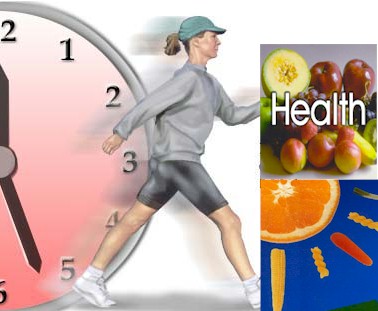 |
Health Psychology 400:154g Dr. Linda L. Walsh |
 |
|
9:30 T Th Sabin 107 |
Table
of Contents
Textbook
Study Aids
Grading Scale
MCKey
Links
to
other Walsh Pages Meet
My Family A
sample of my garden My Summer
|
|
Dr. Linda L. Walsh |
| Office: Baker
441
Office Hours:9-10:30 MWF ; Mailbox: Baker 334 other times by appointment; drop-bys welcome. |
|
| Phone:
273-2690
Email: walsh@uni.edu
Course online syllabus at: http://www.uni.edu/walsh/ |
| Course Objectives |
| 1) Develop an appreciation of the
interaction of biological, psychological and social factors influencing
one's physical well-being and health behaviors. 2) Learn how psychological research methods, theories and principles can be applied to better understand health behaviors, health promotion and health care issues such as patient and caregiver experiences, adherence to treatment regimens, coping with chronic illness and management of pain. 3) Learn about the role of lifestyle factors (diet, exercise, stress, substance abuse, safety behaviors) in the etiology and course of many health problems. 4) Become aware of training and career opportunities in health psychology or related fields. |
Chapter numbers refer to our text: Health Psychology: Biopsychosocial Interactions (6th Edition) by Edward Sarafino
Underlined text refers to World Wide Web documents, easily accessed from our online syllabus at
http://www.uni.edu/walsh/
Lectures draw broadly from many sources so everything we cover will not be found in the text.
Course Requirements
Realizing
that this course draws students from many different majors and with
varying
commitments outside of the class, I have tried to design a flexible set
of assignments that gives you some freedom of choice. A few assignments
I consider important learning experiences for all students. These are
labeled
REQUIRED below. Other assignments may be of interest to students with
particular
career goals/interests or to students who prefer to have a greater
percentage
of their grade based on assignments and a smaller percentage of their
grade
depending on tests. Many students feel like they have more control over
how well they do on assignments vs the uncertainty of how well they
might
do on exams. These assignments are labeled OPTIONAL below. Note that
OPTIONAL
does not mean extra credit: if you choose to do optional assignments
your
"points possible" increases, the relative importance of tests
decreases.
In the end your grade will be based on the percentage of points you
earned.
Our 4 exams will be worth about 125 each or 500 points total. The
remaining
will come from the assignments below. Please note that late
submissions
will lose points.
Class Participation
Assignments (15-20 @ 5 pts each)
We will have a number of "before class" and "in-class" assignments
related to the material that we are covering. Many of these are short
assessments like the "Life Events Stress Test" or "Alcohol Expectancies
Test" listed in the syllabus above. Those listed in the syllabus you
are to do BEFORE class and bring with you (either the surveys you have
printed out and completed or your "results page" from the assessments
you actually take online. Sometimes I will pass out surveys to be
completed in class (these cannot be made up if you miss class). Each of
these activities is worth 5 points. You are required to
complete 15 of them and if you do more than that it will count as
extra credit.
Health Belief and Behavior Data Assignment
(50 pts) Due 9/9
Administer a short health behavior survey to both yourself and
your parents. Discuss similarities and differences and why these might
exist. (Handout will be provided in class)
Biodot Assignment (log and write-up - 50
points) Due 10/2
During the course of a day (or longer) you will monitor your
stress levels using a primitive biofeedback device and record data on
your physical, emotional and cognitive state each hour. You will also
try to modify your physiological state using relaxation techniques.
(Handout provided in class)
Self-Health Check Data Assignment (50 pts)
Due 10/30
Interview 10 or more friends about their self-health check
behaviors. Tally and discuss your results. (Handout provided in class)
Note: Optional does not mean Extra Credit -
it means a greater % of your grade will be based on assignments.
Optional Additional Assignment - Health
Psych in the News (25 pts)
This assignment is designed to encourage awareness of health
psych related issues covered in the news (newspapers, online news
publications, magazines, television news). Find a health psych related
news article or news link or tape a news segment and write a brief
essay relating it to material in our text or that we cover in class.
What does the news item report about health behaviors, health beliefs,
health-related thoughts, attitudes or emotions , behavior change
techniques, etc.? Where did the data come from? Did the news item
provide enough information to allow you to get a sense of the validity
of the report? What questions did you have that remained unanswered?
Does this data "fit" with what is presented in our text?
Optional Additional Assignment - Why Do
People Smoke? (50 pts)
Interview 10 or more smokers about why they smoke and tally ands
discuss your results. (Handout provided in class)
Graduate students will, in addition, be asked to prepare a review of 10 current research reports on a narrowly defined health psychology topic (125 pts; handout will be provided). Keep Dr. Walsh up to date by telling me about the methods and findings of new research on a health psychology topic. Please select and submit your preliminary computer search of research articles on a narrow topic by 10/23, show me 6 related primary sources no later than 11/18, and your completed papers by 12/04.
10 pt Extra Credit. Keep a blank videotape handy to record any shows, segments, or news reports related to health psychology. Turn the tape in to me with a summary of the program , why you think it's relevant to the class, and a critical evaluation of the segment using an evaluation handout.(tape will be returned). May be done once for credit.|
|
|
|
|
|
|
|
|
|
|
|
|
|
|
|
|
|
|
|
|
|
|
|
|
|
|
|
|
|
|
|
|
|
|
About Your Prof
Birthplace: Chicago,
Illinois
Education: B.S.
(Psychology)
University of Illinois, Chicago;
M.A. (Biopsychology) University of Chicago;
Ph.D. (Biopsychology) University of Chicago
Married: James
Walsh (attorney)
Children: 3
girls
(Jennifer, Sara, & Annie)
Hobbies: Gardening,
gourmet cooking, travel, concert-hopping, reading
Most unusual experiences:
Performing
brain surgery on rats, riding an elephant (twice!), climbing the Great
Pyramid, wearing a live python around my neck, flying in a blimp,
visiting
ancient Greek ruins, giving birth
Goals: Continue to
learn for the rest of my life, enjoy my professional and private lives,
help others discover psychology (especially the biological side of
psychology)
Return
to
Table of Contents
Back
to Walsh homepage
[home]
[academic
success] [careers]
[grad
school] [psych
resources] [teaching
resources]
[intro
to psych ] [neurology]
[biopsych]
[help
for new UNI students] [self-help
books]
[counseling
resources]
[e-mail] [online
syllabi]
This page was prepared
by
Linda
Walsh, Dept. of Psychology,
University of Northern
Iowa, Cedar Falls, IA 50614-0505.
Last updated 8/25/08